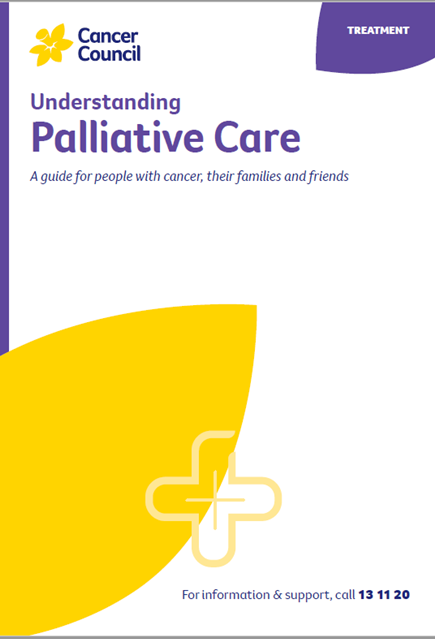- Home
- About Cancer
- Advanced cancer
- Facing end of life
- Common questions about dying
- Who will I see for my care?
Who will I see for my care?
Wherever you receive end-of-life care, the various health professionals in your health or palliative care team can offer a range of services to help you. You may not need to see all the people listed below, but understanding the different roles can help you work out what support is available and who to ask about particular issues.
Possible members of your health care team
| GP or family doctor | may coordinate your palliative care and work alongside a palliative care team; continues day-to-day health care |
| community nurse | visits you at home to supervise medical care, assesses your needs for supportive care, and works with your GP as required; may coordinate your palliative care |
| palliative care specialist, physician or nurse practitioner | treat pain and other symptoms to maximise wellbeing and improve quality of life; usually work in collaboration with your GP |
| cancer specialist | may be a medical oncologist, surgeon, haematologist, radiation oncologist or cancer nurse practitioner; may refer you to the specialist palliative care team and continue to provide treatment to help manage cancer symptoms |
| counsellor | helps you manage your emotional response to diagnosis and treatment and may support you to explore your hopes for your life and your relationships |
| psychologist | provides emotional support and psychological interventions to support coping strategies and symptom management; also works to support family |
| psychiatrist | specialises in the diagnosis and treatment of mental illness, can prescribe medicine and uses evidence-based strategies to manage emotional conditions |
| spiritual care practitioner (pastoral carer, priest, chaplain, minister of religion) | discuss any spiritual matters and help you reflect on your life and search for meaning; if appropriate, may arrange prayer services and other religious rituals |
| pharmacist | dispenses medicines and gives advice about dosage and side effects |
| occupational therapist | assists in adapting your living environment; can suggest equipment, such as a hospital bed, walker, wheelchair and bedside commode (toilet chair) |
| physiotherapist | helps with movement and mobility, and preventing further injury |
| diversional therapist | offers recreational activities to improve your wellbeing |
| dietitian | helps with nutrition concerns and recommends changes to diet |
| speech pathologist | helps with communication and swallowing problems |
| social worker | links you to support services and helps you with emotional, practical and financial issues |
| volunteer | can help with home or personal care and transport, and also offer support and companionship |
→ READ MORE: Could complementary therapies help me?
Podcast: Living Well with Advanced Cancer
Listen to more of our podcast for people affected by advanced cancer
More resources
Prof Jane Phillips, Head, School of Nursing and Professor, Centre for Healthcare Transformation, Queensland University of Technology and Emerita Professor Palliative Nursing, University of Technology Sydney, NSW; Prof Meera Agar, Palliative Care Physician, Professor of Palliative Medicine, University of Technology Sydney, IMPACCT, Sydney, NSW; Sandra Anderson, Consumer; A/Prof Megan Best, The University of Notre Dame Australia and The University of Sydney, NSW; Prof Lauren Breen, Psychologist and Discipline Lead, Psychology, Curtin University, WA; David Dawes, Manager, Spiritual Care Department, Peter MacCallum Cancer Centre, VIC; Rob Ferguson, Consumer; Gabrielle Gawne-Kelnar, Counsellor, Psychotherapist and Social Worker, One Life Counselling & Psychotherapy, NSW; Justine Hatton, Senior Social Worker, Southern Adelaide Palliative Services, Flinders Medical Centre, SA; Caitlin MacDonagh, Clinical Nurse Consultant, Palliative Care, Royal North Shore Hospital, Northern Sydney Local Health District, NSW; McCabe Centre for Law and Cancer; Palliative Care Australia; Belinda Reinhold, Acting Lead Palliative Care, Cancer Council QLD; Xanthe Sansome, National Program Director, Advance Care Planning Australia; Kirsty Trebilcock, 13 11 20 Consultant, Cancer Council SA.
View the Cancer Council NSW editorial policy.
View all publications or call 13 11 20 for free printed copies.

